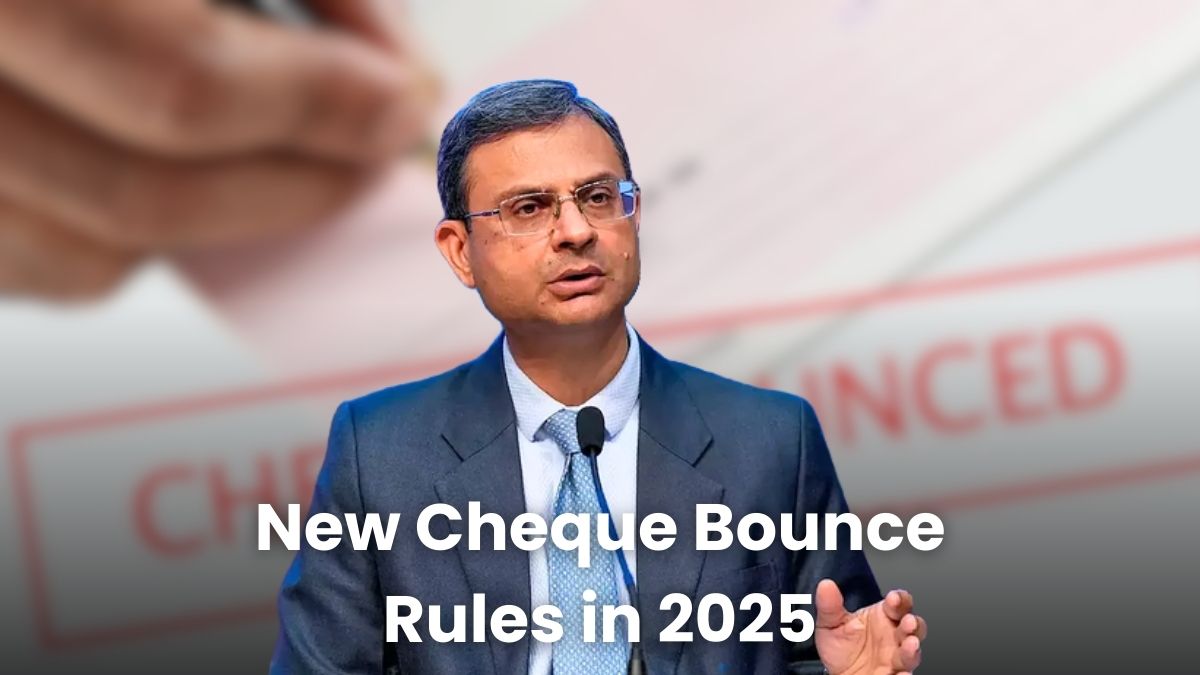Cheque Bounce New Rules – Starting from April 1, 2025, the Indian government has rolled out new rules for cheque bounce cases under the Negotiable Instruments Act. These changes are designed to reduce financial fraud, make the system more transparent, and ensure people who receive cheques are protected. If you deal with cheques regularly, you should definitely be aware of these updates. Here’s a simple breakdown of what has changed and what you need to do to stay out of trouble.
Stricter Punishment for Cheque Bounce
One of the biggest updates is the punishment for intentionally bouncing a cheque. Earlier, the maximum jail time was one year. Now, it has been doubled to two years. Plus, the person who bounced the cheque can be fined up to twice the amount written on the cheque. This is a big deal and shows that the government is getting serious about financial discipline.
That said, if a cheque bounces due to genuine technical issues or bank errors, you may still get some relief. But if it was done knowingly or due to carelessness, you could land in legal trouble quickly.
Filing Complaints Is Now Easier and Online
Earlier, if someone’s cheque bounced, they had a short window to take legal action. Now, with the new rules in 2025, this process has become more relaxed and user-friendly. You can now file a complaint online, which is much quicker than the old offline methods.
Here’s what you need to do:
- Get a cheque return memo from your bank within 30 days of the cheque bouncing.
- You now have up to three months (from the date the cheque was issued) to file your complaint. Earlier, this window was just one month.
This change gives victims more time to act and ensures that they don’t lose their chance to get justice due to short deadlines.
New Rules for Banks
Banks also have new responsibilities under the updated law. They now need to act faster and communicate better with their customers. Here’s what they must do:
- Send SMS and email alerts within 24 hours of the cheque bounce.
- Explain clearly why the cheque was dishonoured, instead of giving vague reasons.
These changes are meant to cut down on confusion and help both parties understand what went wrong so they can resolve the matter quickly.
How to Avoid a Cheque Bounce
The best way to deal with cheque bounce issues is to avoid them altogether. Here are some simple tips you should follow:
- Always double-check the date on your cheque.
- Never use a damaged or torn cheque.
- Make sure you have enough money in your account before issuing a cheque.
- If possible, use crossed cheques. This means drawing two parallel lines on the top left, which makes sure the cheque is not encashed directly but only deposited in the payee’s account.
- Write the amount clearly in both numbers and words to avoid confusion.
Safer Alternatives to Cheques
With so many digital payment methods available now, it might be a good idea to shift away from physical cheques altogether. You can use options like UPI, NEFT, or RTGS for safer and quicker transactions. These methods also provide immediate confirmation and are more reliable when it comes to avoiding errors or legal issues.
What to Do If Your Cheque Bounces
If a cheque you issued gets bounced, don’t panic. Take these steps immediately:
- Contact the person you gave the cheque to and explain the situation.
- Try to clear the dues within 15 days. If you pay within this period, you might avoid legal action.
- If someone files a case against you wrongly or without valid reason, consult a lawyer and take the right steps to defend yourself.
The new cheque bounce rules of 2025 show that the government is serious about preventing financial fraud and encouraging responsible banking behavior. With tougher penalties, an extended complaint window, and more accountability for banks, the system is now more balanced and protective of honest payees.
So whether you are writing cheques or receiving them, it is important to stay updated and follow best practices. This will not only keep you out of legal trouble but also help maintain your financial credibility.




